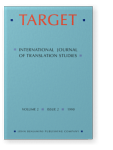Article published In:
TargetVol. 2:2 (1990) ► pp.199–218
Surely There Must Exist a Polish Equivalent
On the Inadequacy of Dictionary Explications
The paper is a contribution to the ongoing discussion on the requirements that dictionaries should meet in order to satisfy the needs of language learners and translators. The shortcomings of some standard dictionaries are discussed in reference to one particular item: the modal qualifier surely and its Polish equivalents. The latter were compared with actual choices made by a group of advanced Polish learners of English, asked to translate five explanatory sentences taken from English—English dictionaries. Discrepancies between dictionary equivalents and translation replacements clearly suggest that apart from "prototypical" examples of usage, dictionary entries should also contain potential discourse functions of sample sentences.
Article outline
- 0.Introduction
- 1.The Semantics of Surely
- 2.Polish Dictionary Equivalents
- 3.Analysis of the Data
- 3.1Chyba
- 3.2Finite Forms
- 3.3Polarized Expressions
- 3.4.Expressions of Increased Probability
- 3.5The Question Tag
- 3.6Przecież
- 3.7Answers
- 4.Conclusions
- Notes
- Dictionaries
-
References
References
Antas, Jolanta and Elżbieta Fajfer
1985 “
O szczególnym funkcjonowaniu modulantów skladnikowych w przekazach telewizyjnych”.
Rokoszawa and Twardzik 1985
. 117–127.

Boers, Frank
1987 Behind, Beyond, Under, Underneath, Beneath, Below: A Descriptive and Explanatory Study of Spatial and Non-spatial Senses. Antwerp: Universiteit Antwerpen. [Antwerp Papers in Linguistics, 53]

Grochowski, Marek
1986 Polskie partykuly: Skladnia, semantyka, leksykografia. Wroclaw: Ossolineum.

Grzegorczykowa, Renata
1985 “
O funkcji impresywnej zdań Stwierdzających”.
Rokoszowa and Twardzik 1985
. 73–78.

Halliday, M.A.K.
1985 An Introduction to Functional Grammar. London: Arnold.

Honowska, Maria
1984 “
Prawdopodobnie. (Przyczynek do teorii aktu mowy)”.
Polonica 101. 121–131.

Jodlowski, Stanislaw
1976 Podstawy polskiej skladni. Warszawa: PWN.

Karttunen, Lauri
1972 “
Possible and Must”.
John P. Kimball, ed.
Syntax and Semantics, 11. New York: Seminar Press 1972 1–20.

Leech, Geoffrey and Jan Svartvik
1975 A Communicative Grammar of English. London: Longman.

Mayenowa, Renata
1983 “
Próba eksplikacji wyrazu przecież
”.
Pamietnik Literacki 74:2. 175–182.

Quirk, Randolph, Sidney Greenbaum, Geoffrey Leech and Jan Svartvik
1972 A Grammar of Contemporary English. London: Longman.

Rokoszowa, Jolanta and W. Twardzik
eds. 1985 Nowo-mowa. Materialy z sesji naukowej poświęconej problemom wspólczesnego języka polskiego odbytej na Uniwersytecie Jagiellońskim w dniach 16 i 17 stycznia 1981. London: Polonia.

Tabakowska, Elżbieta
1989 “
Lexical Markers of Subjective Modality and Equivalence in Translation”.
Multilingua 8:1. 21–36.


Wierzbicka, Anna and P. Wierzbicki
1970 Praktyczna stylistyka. Warszawa: Wiedza Powszechna.

Cited by
Cited by 1 other publications
Farghal, Mohammed & Mohammed O. Al-Shorafat
This list is based on CrossRef data as of 9 june 2024. Please note that it may not be complete. Sources presented here have been supplied by the respective publishers.
Any errors therein should be reported to them.
